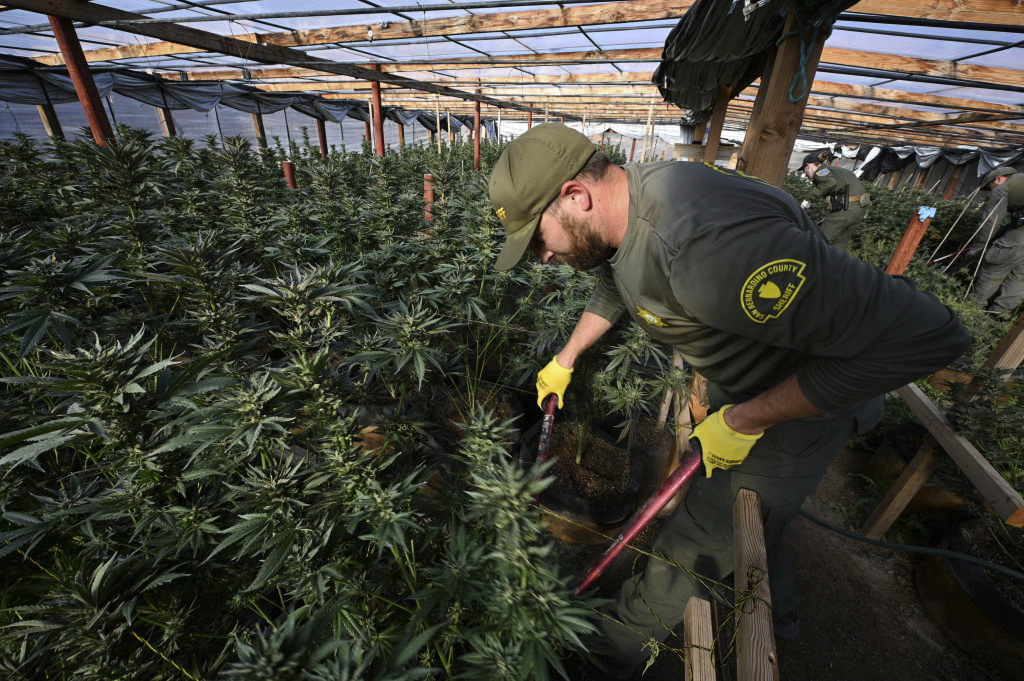Pretty sure this story is accurate.
Pretty sure this is what is happening in EVERY STATE that legalizes marijuana. Yes, there are legal pot sales at pot dispensaries with taxes paid. But the costs to society far exceed the revenues from taxes. And the taxes are too high, which allows for easy exploitation by gangs and cartels. Most people, even in "legal" states get their pot from their friendly neighborhood dealer.
I used to be in the cigarette distribution business. Back in my day, it was common practice for people to come in and buy a literal van load of cheap "Indiana" low-taxed cigarettes and drive them up into Chicago to sell them at a 100% markup and still undercut the prices charged in local stores. We had "apartment sellers" too. Someone, usually a retired guy or retired lady, would come in once a week for a 'standing order' of 30 to 60 to sometimes 90 cartons of cigarettes. (Each carton is 10 packs). So we are talking about granny buying a few cases of cigarettes every week. They drive home and sell them to their neighbors in their apartment building, and this happened EVERY WEEK.
I'm pretty libertarian and don't have an issue with people choosing to throw their lives away on drugs . . . right up until it affects society. We are past that point. And pot legalization is not a solution but an expansion of failed policy.

 www.gatestoneinstitute.org
www.gatestoneinstitute.org
 Six years after California legalized marijuana, the bodies keep piling up. Drug legalization has failed on every level. The legal drug business is collapsing. Cartels and gang members dominate the business. And open borders allowed them to bring massive numbers of laborers to boost their ranks. Pictured: San Bernardino County Sheriff's deputies and other law enforcement agents cut down cannabis plants during a raid on an illegal cannabis farm in Newberry Springs, in the western Mojave Desert of California on March 29, 2024. (Photo by Robyn Beck/AFP via Getty Images)
Six years after California legalized marijuana, the bodies keep piling up. Drug legalization has failed on every level. The legal drug business is collapsing. Cartels and gang members dominate the business. And open borders allowed them to bring massive numbers of laborers to boost their ranks. Pictured: San Bernardino County Sheriff's deputies and other law enforcement agents cut down cannabis plants during a raid on an illegal cannabis farm in Newberry Springs, in the western Mojave Desert of California on March 29, 2024. (Photo by Robyn Beck/AFP via Getty Images)
Pretty sure this is what is happening in EVERY STATE that legalizes marijuana. Yes, there are legal pot sales at pot dispensaries with taxes paid. But the costs to society far exceed the revenues from taxes. And the taxes are too high, which allows for easy exploitation by gangs and cartels. Most people, even in "legal" states get their pot from their friendly neighborhood dealer.
I used to be in the cigarette distribution business. Back in my day, it was common practice for people to come in and buy a literal van load of cheap "Indiana" low-taxed cigarettes and drive them up into Chicago to sell them at a 100% markup and still undercut the prices charged in local stores. We had "apartment sellers" too. Someone, usually a retired guy or retired lady, would come in once a week for a 'standing order' of 30 to 60 to sometimes 90 cartons of cigarettes. (Each carton is 10 packs). So we are talking about granny buying a few cases of cigarettes every week. They drive home and sell them to their neighbors in their apartment building, and this happened EVERY WEEK.
I'm pretty libertarian and don't have an issue with people choosing to throw their lives away on drugs . . . right up until it affects society. We are past that point. And pot legalization is not a solution but an expansion of failed policy.

California Legalized Drugs. Cartels Took It Over.
Six years after California legalized marijuana, the bodies keep piling up. Earlier this year, six men were murdered in the Mojave Desert. Four of the men had been burned after being shot with rifles. In 2020, seven people were killed at an illegal pot
California Legalized Drugs. Cartels Took It Over.

Six years after California legalized marijuana, the bodies keep piling up. Earlier this year, six men were murdered in the Mojave Desert. Four of the men had been burned after being shot with rifles. In 2020, seven people were killed at an illegal pot operation in Riverside County.
Violence like this was supposed to disappear after legalization. Legalization advocates argued that making the drug trade legal would end the grip of the cartels. Instead, the legal market has failed, and the cartels are taking over sizable parts of California and the rest of the country.
California's legal drug revenues have fallen consistently, as have those in other legal drug states including Colorado, whose model helped sell the idea that drug money would fix everything.
Despite falling revenues, Colorado legislators brag about $282 million in drug revenue. That number may sound high, but it's a drop in the bucket considering the money that the state and cities like Denver are spending on homelessness, drug overdoses and law enforcement.
While the legal drug business is also collapsing in California, the state is spending a fortune fighting marijuana even as it tries to tax it. Gov. Gavin Newsom paradoxically promised to close the budget deficit with $100 million in drug revenue, meant to be used to fund law enforcement and fight substance abuse. The state seized over $300 million in illegal pot this year and uses satellite imagery and heavily-armed raids to fight untaxed marijuana.
But despite all those efforts, illegal marijuana has won and legal marijuana has lost.
The Los Angeles Times warned two years ago:
"Proposition 64, California's 2016 landmark cannabis initiative, sold voters on the promise a legal market would cripple the drug's outlaw trade, with its associated violence and environmental wreckage."Instead, a Los Angeles Times investigation finds, the law triggered a surge in illegal cannabis on a scale California has never before witnessed."Rogue cultivation centers like Mount Shasta Vista now engulf rural communities scattered across the state, as far afield as the Mojave Desert, the steep mountains on the North Coast, and the high desert and timberlands of the Sierra Nevada."Residents in these places describe living in fear next to heavily armed camps..."
Some of the growers are private citizens, but they aren't likely to remain in business for long.
Cartels and gang members dominate the business. And open borders allowed them to bring massive numbers of laborers to boost their ranks. Not only California, but places as far afield as Maine that have large open areas and limited law enforcement resources, have been overrun by drug operations that more closely resemble parts of Latin America and Asia than the USA.
The coasts, from Southern California up to Oregon, are controlled by Mexican cartels which have expanded so much that they're running short of workers even during the Biden open borders boom. Some have taken to brazenly advertising for illegal workers in Europe.
A local California DA described "Mexican cartel groups coming up to grow pot, and people from Bulgaria, France and Russia." The vast exodus across the border has made it possible for cartels to freely bring in any workers they want, even as drug legalization and open borders effectively ended any real penalties for either illegal migration or marijuana.
Asian organized crime may be less on the radar, but it is no less ruthless or violent.
A few years ago, four Chinese people were murdered at an Oklahoma illegal pot farm. Chinese organized crime had "taken over marijuana in Oklahoma and the United States," the head of the Oklahoma Bureau of Narcotics and Dangerous Drugs revealed.
Once again, "the mafias set their sights on Oklahoma when the state's voters approved a ballot measure that legalized the cultivation and sale of marijuana for medicinal purposes." Now the Triads run their own compounds "ringed by fences, surveillance cameras and guards with guns and machetes" with 3,000 illegal grows having a value estimated at as high as $44 billion a year.
The Triads are not just in the illegal marijuana business, they traffic in everything from heroin to fentanyl. Legalizing marijuana, however, provided them with a profitable and semi-legal market that gives them a base to expand their efforts trafficking in even more lethal drugs.
Drug legalization has failed on every level. The legal drug business is collapsing. MedMen, which once promised to be the Apple of weed, fell from a $3 billion valuation to a bankruptcy with $411 million in liabilities. Despite the green crosses and online apps, 80% of Californian's pot is still the old-fashioned illegal kind. Politicians may be boasting about hundreds of millions in revenue, but the cartels are making tens of billions and they're taking over entire forests.
The future isn't pot shops, weed apps or MedMen: it's Mexican and Chinese organized crime compounds that are spreading across the West and parts of New England like a plague.
Legalization advocates still argue that if the government lowered the high taxes on legal pot, the business model could turn around again, but even without a single penny in taxes, no amount of legal labor is going to be able to compete with illegal aliens smuggled across the border and forced to work for free by gunmen. Legal businesses can't compete with organized crime.
Drug legalization increased homelessness and drug abuse. It boosted illegal migration and organized crime. It made life worse in every state and city where it's been tried without delivering tangible benefits to anyone (including weed users who still get theirs the old-fashioned way) except for a few politicians who temporarily have a few million more to pass around to special interests, donors and lobbyists.
And all they had to do was hand over half the country to organized crime.
Daniel Greenfield is a Shillman Journalism Fellow at the David Horowitz Freedom Center. This article previously appeared at the Center's Front Page Magazine.

